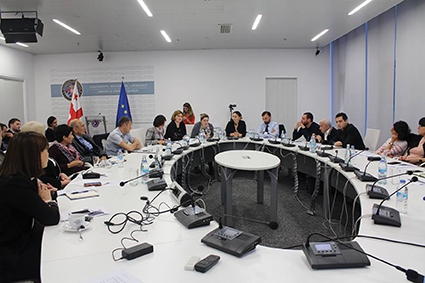Georgia’s Min of Energy Hosts Presentation on EU Renewable Energy Directive
On Wednesday, October 12, PMC Research, together with the Konrad Adenauer Foundation, hosted a presentation and public discussion of the research findings ‘Challenges and Opportunities of Renewable Energy in Georgia.’ The presentation took place at the Ministry of Energy of Georgia.
Mariam Valishvili, Deputy Minister of Energy, opened the presentation. A researcher at PMC Research presented the research outcomes, while researcher Nikoloz Sumbadze further elaborated on research implications. The presentation was followed by a discussion, moderated by Ms. Valishvili.
The representatives of the Georgian National Energy and Water Supply Regulatory Commission, the Georgian State Electro system, the Electricity System Commercial Operator, electricity distribution companies, and non-governmental organizations all participated in the discussion.
The research aimed to provide analysis of the concept of compulsory measures of the EU Renewable Energy Directive (2009/28/EC) and to identify the gaps in the Georgian legislation on energy in terms of conformity with this EU directive. During the presentations of research results and discussion of its limitations, several recommendations were provided on how to mitigate gaps between Georgian legislation and EU directive to override problems concerning compliance with the directive.
As research results suggest, in order to ensure compliance, Georgia needs to elaborate a Renewable Energy Action Plan. Further, current sources of energy consumption and transport energy consumption should be evaluated and future consumption patterns should be forecasted.
Another important recommendation suggested that one of the major obstacles in the proper development of renewable energy resources is administrative measures which represent risks for potential investors.
During the discussion, the Deputy Minister also highlighted the significance of EU grants, high costs of logistics and other obstacles in relation to meeting EU directives.
In accordance with the research findings, Valiashvili also stressed the importance of clear administrative measures in order to avoid bureaucracy, as well as improving procedures related to RES development and implementation.
Natia Liparteliani












